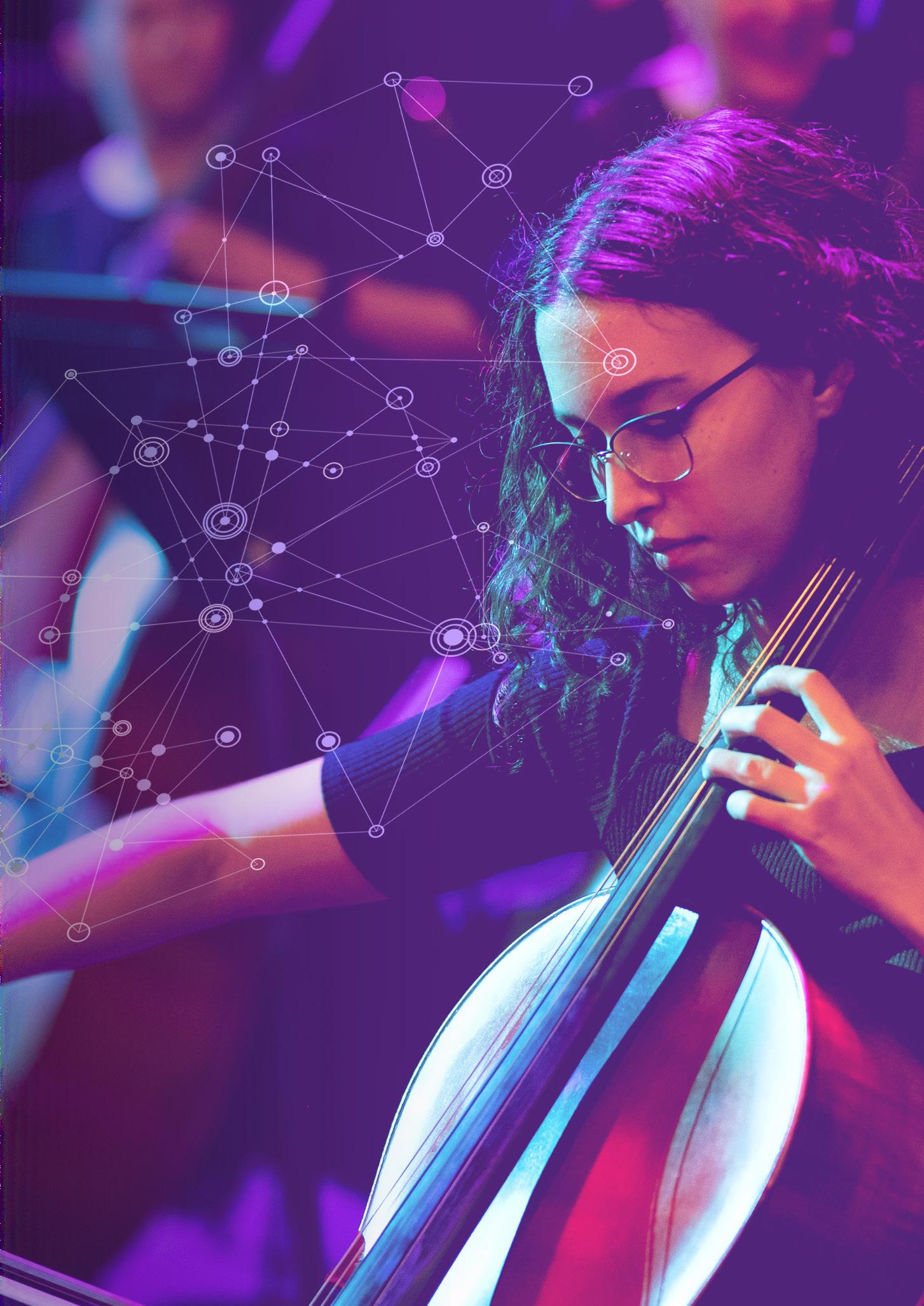
7 minute read
Vision, Mission, and Values
from SoM Decennial review
by Paul Young
The UQ School of Music’s vision is to be a global leader in university-embedded music creation, education, research and engagement; where musical art, learning and knowledge are interconnected, integrated and shared for a better world.
The School of Music’s mission is to educate people who are prepared for music professions and are connected to the world of ideas. Our people create music and generate research that expands our understanding of music as art and as a social phenomenon. We engage in ways that elevate our students, share our knowledge and enrich our community.
Advertisement
At the heart of the School of Music is a passion for music’s intrinsic value as art. Our community is motivated by a belief that music is an inherently positive and powerful contributor to human flourishing and our activities reflect the capacity for music-making to model a better world. A major musical performance by the UQSO and UQ Chorus, for example, can involve over a hundred performers (usually staff, students, alumni and partners together), cooperating over many months in pursuit of a common goal. At the performance itself, audience-participants join the performers, sometimes many hundreds of people in sum. These people gather in a communal setting to listen – mutual, respectful, reflective listening – a rare and powerful act in contemporary society.
Music fosters connections and bonds through the powerful experience of interacting with another person’s feelings and perspectives. The relational experiences and knowledge that we create and share with others can, ideally, help shape a better future in both large and small ways through the cultivation of understanding and empathy. Music, as a performing art, has the power to challenge, celebrate and educate all co-participants in social praxis, helping to shape who we are and who we strive to be as individuals and a society. These contributions inform our values, which also reflect UQ’s values of Creativity, Excellence, Truth, Integrity, Courage, Respect and Inclusivity.
The need to nurture the next generation of musicians has taken on new urgency. The performing arts sector faces long-term impacts from COVID-19, yet music’s role in building wider societal resilience is crucial. Fortunately, School of Music graduates are uniquely positioned to build meaningful careers. Many of our graduates go on to work in the performing arts, while others enter academia, teaching, arts administration and a variety of pathways that benefit from the creativity of a musical mind.
Cultivating our students’ inherent musicality can enhance preparation for a fluid and volatile world of work, if not general citizenship. As a discipline, music intersects with a surprising number of capabilities, engaging of the mind, body and emotions. Musicians understand both theory and practice and how they connect, deploying multiple modes of understanding simultaneously in the act of music-making. They learn to hold substantial abstract mental structures in their mind, especially when they memorise a piece of music. In ensembles they work as a team, learning how to both lead and follow, and how to give and receive feedback on a constant basis. Music requires verbal, non-verbal, physical, intellectual and emotional sophistication, communication and capabilities – life-sustaining skills no matter how a particular career unfolds.
Leadership in the creation of knowledge about music is also crucial, as modes of communication shaped by artistic forms continue to dominate our daily lives. Music researchers seek to understand the role of sound in the modern world, how it affects our mind and emotions, how it creates connections between people and how it facilitates experiences of great value to us.
Music plays an important role in a challenging world. Creating a better future through music requires an expansive view of music education, research and engagement. At the School of Music we build our vision on the notion of “Music and…”, UQ being the place for musicians who want to connect their passion for music with the broader world of imagination and knowledge. Our staff and students understand that music does not function in isolation, but in relation to people, places and ideas. Fittingly, a sense of community is palpable at the School and is one of our defining features.
The School of Music’s distinctiveness lies in the flexible seam of engagement that infuses all of its activity. Few other Schools at UQ are able to bring cultural experiences directly to thousands of people every year, while also building excellence in teaching and research. We are, for example, uniquely positioned to make an impact through the University’s Queensland Commitment, and to meaningfully contribute to Reconciliation. Part of our potential as a School derives from the ways in which our approach differs from the traditional conservatorium model. In that context, we welcome guidance on how to realise and amplify our vision, mission and values.
1.1 The School at a Glance
The School of Music is creative, highperforming and strongly engaged. Its tightknit community of staff and students generate world-class teaching and research outcomes, while culturally enriching the community at UQ and beyond.
Twelve continuing full-time equivalent (FTE) academic staff members (10 Teaching and Research, 2 Teaching Focused), supported by 3 FTE continuing professional staff members, span the disciplines of:
• musicology
• music education
• music composition
• music performance
• popular music and technology
• psychology of music.
Awarded over 1,000 BMus and BMus(Hons) degrees since 1968
1.1.1 Teaching and Learning
Undergraduate and postgraduate coursework teaching programs offered by the School include:
• Bachelor of Music (Honours) (BMus(Hons))
• Bachelor of Arts (BA)
• Music major and extended major
• Popular Music and Technology major
• Music Psychology minor
• Master of Music (MMus)
• Graduate Certificate in Music (GCMus).
The School also offers Higher Degree by Research (HDR) programs — Master of Philosophy (MPhil) and Doctor of Philosophy (PhD) — in all disciplines with relevant staffing expertise.
BMus(Hons) dual degrees are offered with the Bachelor of Science (BSc), BA and Bachelor of Education (Secondary) (BEd(Sec)). Students value the ability to study music alongside other disciplines on the St Lucia campus and our teaching philosophy reflects this openness to intellectual diversity within music education.
Our programs prepare students for professions in music performance, composition, technology, teaching, academia and a wide range of careers in which musical knowledge, background and capability is valued. Student outcomes and satisfaction reflect well on our teaching and programs at all levels, with outstanding graduates in music professions around Australia and internationally. Our Student Evaluation of Course and Teacher (SECaT) averages for course quality were 8th highest at UQ (of 30 Schools) in 2021. The School’s commitment to employability is distinguished by high levels of participation in collaborative side-by-side staff-and-student learning, research and performance activities.
1.1.2 Research
The School of Music’s research performance is characterised by excellence and quality over many decades, consistently punching above its weight in terms of recognition, impact and engagement. Our research profile is distinctive for high-quality discovery and music creation. We aspire to excellence across discipline-specific, interdisciplinary and artistic spheres through engagement and collaboration with our local, national and global partners. The School’s research output arises from traditional and non-traditional activity in approximately equal amounts, with musicology, music education and the psychology of music sitting alongside creative works and artistic outputs in composition and performance. There is overlap and collaboration between disciplines throughout and beyond the School. Music disciplines at UQ have consistently achieved an Excellence in Research for Australia (ERA) ranking of ‘4’ (above world standard) in every exercise since ERA’s inception in 2010. The School’s researchers attract funding, lead academic bodies, edit major journals and receive international recognition for their work.
400+ hours of virtual concerts broadcast in 7 countries during 2021
1.1.3 Engagement
Public engagement constitutes a significant component of the School’s activity and its value to the University. We create a rich and vibrant culture that allows all areas of the School to connect to the community. Each year, many performances and events are presented in venues on campus, around Brisbane and beyond. Relative to its size, the School makes a significant contribution to UQ’s public and cultural engagement profile and it has great potential to lead through the
University’s recently announced Queensland Commitment by building on its strong regional connections. The School has demonstrated leadership in working with Indigenous musicians to create innovative learning, performance and engagement opportunities for students that also contribute to UQ achieving the goals of its Reconciliation Action Plan.
1.1.4 Current Operational Context
The School’s financial position should be understood within the context of delivering high-quality music education, which requires investment in individual and small-group tuition. Student enrolment trends indicate recovery since 2020, with strong rebound in international student numbers in the MMus. The School community works with minimal resources to generate significant outcomes with efficiency and creativity.
153 Master of Music degree graduates since 2016
1.1.5 Broader Context
The last School of Music review was conducted in 2012. The current review was originally scheduled for 2019 but subsequently delayed during the search for a new Head of School and further by the temporary suspension of UQ reviews due to COVID-19. Planning for this review began in earnest in early 2021, with two major all-staff strategic planning days held that year (February and September) and three more across late February and March 2022.
This review comes at an opportune moment, as the COVID-19 pandemic invites us to consider the future of music higher education. Many of the trends and challenges we were already facing as a society (and by extension as a sector) before the pandemic have now been accelerated. Employment precarity, the continuing rise of automation and issues in health and wellbeing are increasingly acute.
In the university sector, developments such as the federal Job Ready Graduates (JRG) legislation and changes to the Research Block Grant (RGB) scheme are creating financial headwinds for the arts, humanities and social sciences disciplines. A turbulent environment and a high rate of change in recent years has had significant impact on students and staff.
Despite these challenges, the role of music during the pandemic has brought forward its fundamental importance to people, communities and societies. There are opportunities to contribute to new artistic developments in music as well as to develop understandings about how music operates among people and in the world more broadly. Music education can also build on the recognition that its graduates have always displayed transferrable skills that workers need in this era of uncertainty and change – capabilities such as teamwork, projectmanagement, self-directed learning and the ability to absorb, interpret and creatively apply information in a variety of contexts. Music institutions can celebrate their role in enriching communities, whether local or global, including contributions to Indigenous recognition and reconciliation processes.
In this context, the School’s strategy into the future is underpinned by principles of consolidation and integration. Strategic priorities include a concentration on the student experience (including recruitment and retention), researcher development and supporting staff. We celebrate and build on our distinctive and multifaceted identities which include a diversity of disciplines, integrated practical and scholarly paradigms, a highly engaged ethos and cultural contributions to the community.
We have presented 500 concerts from 2012-2022








